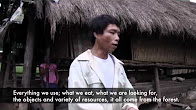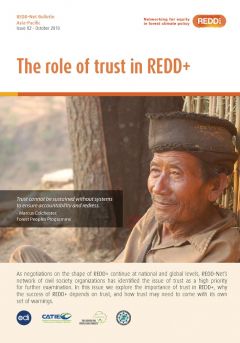Relaciones de autoridad en el marco de los nuevos arreglos de tenencia forestal
Rights to forests and carbon under REDD+ initiatives in Latin America
Rights to large areas of forest have been granted to communities and indigenous peoples in Latin America, offering these groups an opportunity to participate in REDD+ initiatives. However, tenure is not always secure, and security of tenure alone is insufficient to guarantee positive outcomes for both forests and livelihoods. The question of carbon tenure rights has only just begun to be addressed, and even less attention has been given to liabilities. REDD+ initiatives provide an opportunity to consolidate indigenous territories but present a risk to those without secure land rights.
The state of REDD negotiations: consensus points, options for moving forward and research needs to support the process
The United Nations Collaborative Programme on Reducing Emissions from Deforestation and Forest Degradation in Developing Countries (UN-REDD) commissioned this report from the Center for International Forestry Research (CIFOR) to summarize the current state of negotiations towards a decision in Copenhagen, specifically outlining areas of consensus, options for resolving areas where consensus has not yet been reached, and priorities for research to support successful implementation of an international REDD Programme following a decision at the 15th Conference of the Parties (COP) in Copenhage
Coexistence of silver fir and beech in the Dinaric Alps : implications for conservation and management of silver fir
The tree species composition of silver fir and beech forests has changed in space and time due to a number of direct and indirect natural and anthropogenic causal factors. Forming silvicultural guidelines, therefore, requires a sufficient understanding of the ecological, historical, economic and general environmental factors that influence silver fir-beech forests.
Une modélisation d’accompagnement pour la gestion combinée des systèmes d’élevage et des milieux boisés sur le Causse du Larzac
Once the conditions that led to the creation of the Société Civile des Terres du Larzac (SCTL) have been introduced, the companion modelling approach used with this group of farmers is presented. The agent-based model co-constructed with a group of researchers and technicians is then described, as well as the way it was used to confront scenarios developed by the SCTL to envision management options of the forest massif, with scenarios developed by the farmers to improve the current functioning of their farms
National Committee on Forest Rights Act
The Ministry of Environment and Forests and the Ministry of Tribal Affairs constituted a Joint Committee in April 2010 to review the implementation of the Scheduled Tribes and Other Traditional Forest Dwellers (Recognition of Forest Rights) Act, 2006 popularly known as Forests Rights Act (FRA) in the country with a specific TOR outlined for the purpose.
Village Voices of Amphan, Southern Laos
Amphan describes how everything comes from the forest.
Report to The People On Environment And Forests 2010-11
The 'Annual Report to the People on Environment and Forests' by The Ministry of Environment and Forests (MoEF), Government of India tries to make the citizens of India aware of country's State of Environment and generate greater environmental consciousness amongst them.
REDD-Net Asia-Pacific Bulletin #2: The Role of Trust in REDD+
As negotiations on the shape of REDD+ continue at national and global levels, REDD-Net’s network of civil society organizations has identified the issue of trust as a high priority for further examination. In this issue RECOFTC explores the importance of trust in REDD+, why the success of REDD+ depends on trust, and how trust may need to come with its own set of warnings.
Aspectos socioeconómicos y culturales del manejo forestal en dos ejidos de Quintana Roo.
Los bosques tropicales albergan la mayor diversidad genética del mundo (Cincotta et al., 2000). Sin embargo, estos ecosistemas están siendo drásticamente transformados especialmente por deforestación y sobrexplotación de especies de importancia comercial. En México, 80 % de los recursos forestales están en manos de ejidos y comunidades (White y Martín 2002), lo que es una fortaleza por lo que el aprovechamiento forestal sustentable resulta en beneficios directos para los pobladores de dichas áreas forestales.





